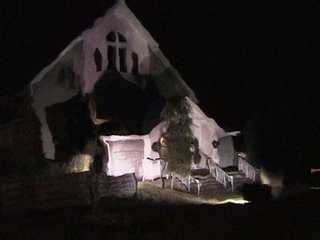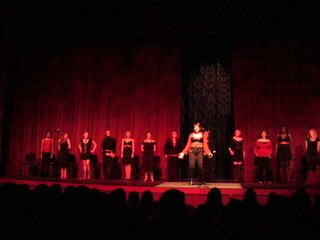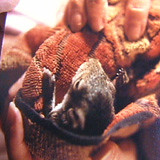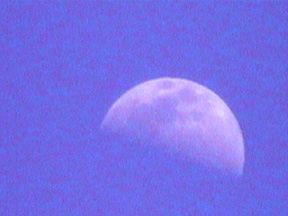
I have always known that I was raised in a fundamental church. Basic Baptist, way down south - hot sweaty Sunday nights in a Mississippi church in the late 1930s with old women crying and fanning their tears with funeral parlor fans and acknowledging themselves to be miserable sinners and “wretches”. Long altar calls, with a tired choir singing “just one more verse” and tearful grandmothers boldly walking up to you, squeezing your arm tightly, and asking again: “Are you SURE you’re saved, young man?”
After high school, I began drifting away from that Muggy Fundamental Ocean, and in my 25th year I sailed full steam into the Episcopal seas of Refinement and Contentment, and spent another 25 years riding those carefree and eloquent religion-cruise ships. But I slowly began to see the church less and less as a sanctuary, and more and more as some kind of a beautiful cage. Part of me recognized that feeling, but I repressed both it and its significance, and concentrated on the fine beauty of those glorious anthems and the solemn pulse of its ancient rituals.
However, one spring morning, while sitting up front, where lay readers sit after they have read, and while looking out over a sleepy and bored congregation which was pretending to listen to a new, young priest explain Paul’s message in II Corinthians (the “ ... wives, submit to your husbands” part), and while he was pointing out how that part of Paul’s message was generally misunderstood, because Paul was really, in fact, one of the very first “womens’ libbers”, I was paid a visit by Casual Question who walked up to me and asked “What are you doing here?” I was astonished that I not only had no ready answer, but could not even fashion one; in fact, my silent search for a rebuttal amazingly began turning into a soliloquy in which I found myself explaining to myself why I was going to leave the Episcopal Church. To my credit, I did not get up and leave at that instant, but when I did leave the church later that morning, it was for good.
Now, looking back from even further away, I can realize that my religious beginnings way back in that hot, sweaty Baptist church were really very metaphysical, even mystical, and for that matter absolutely occult! A lot was expected of a young man on those faraway southern nights, and little was graphically explained. “Are your garments spotless, young man? Ah, but are they white as snow? And how about you? Are you washed in the blood of the lamb?” Well, how metaphysical, mystical, or occult can you get? It was a puzzle. I remember wondering if one’s “garments” should be white or should they be red? I knew that blood was red, and also knew that it stained, and for a year or two I was shamed to realize that my “garments” probably were “white as snow” because I had clearly not washed them yet in any kind of blood. In fact, they probably weren't even spotted!
I finally asked someone in the church about this and thought I was going to be burned at the Baptist stake; at least I finally knew that white was good. But the mystery deepened: how could dirty garments be made white by washing them in blood? And then, there was the preacher: a man of enormous girth, jowls, and eyebrows; swept by wild winds of passion, given to slamming his bible onto the pulpit, and rising on his tiptoes, to shake clenched fists, and shout at the ceiling - it was hard to imagine him wearing garments white as snow; even when he smiled, he seemed wrapped in blood-bright crimson cloth. Well, I never asked another question in church again, even to this day.
“Rock of ages, cleft for me; let me hide myself in thee ...” That old song carried mystic worlds of meaning to a generation that was still only seventy years from the War between the States, and which was still sunken in the great depression and also quickly falling into a war whose outcome seemed likely to have already been secured by the Germans and Japanese. We didn’t sing the “Battle Hymn of the Republic”, (that was for Yankee Heaven), and we didn’t sing “When the Saints Go Marching In “ (Negro Heaven), but we could march in place to “Onward Christian Solders”, “All Hail the Power of Jesus’ Name”, and “Holy, Holy, Holy!” And there was not a lot of mysticism in some of those songs. Others though, like: “ ... Crown him, ye martyrs of our God, Who from his altar call: Extol the Stem-of-Jesse’s rod, And crown him Lord of all!” Well, who knew what all that meant? I finally figured it out about 50 years later, but by then it really didn’t make any sense, because by then I also knew that Doctrine had inserted the Gabriel/Joseph hiatus in the Jesse/Ruth link with Jesus, so it never had been real to begin with, and what about Mary? From whom had she descended? Well, the Jesse link was mainly to show the Jewish connection, and I’ve seen Mary’s picture, hanging in a French gallery, and she was clearly a blue-eyed blond, probably from somewhere in Holland.
And what is the “saved” bit? In order to be “saved”, one must “believe ON the Lord Jesus Christ.” Well, I believed IN Jesus - did that count? Of course, by now I was afraid to ask, but it did sound awfully easy and simple. If you were not saved, then, when you died, your soul went to hell for all eternity. If you were saved, then your soul would go to heaven for all eternity. I can remember wanting to go to heaven, but not right away, because it sounded awfully boring. I began to envy those preachers who talked about the life of sin they had led before they were saved, and it seemed to me that if I had to be saved right now, I would miss out on a lot; such as why I would want to be saved in the first place. I was told that when I got to heaven I would have a harp and walk on streets of gold, and that if we all were saved, then we would all be reunited as a family after death. There would be my mother and father, and their mothers and fathers would also be there, and we would all live together. There would also be their mother’s and father’s mothers and fathers too, and so on. And then there would be my kids, if I ever had any, and in time, their children and their children’s children; and we would all live together in heaven as one great big family, walking on streets of gold with everybody else’s families and forever playing all those harps.
So heaven was not a major objective in my young life. It was better than hell, but still not much of a prize for an 8 year old. Besides, my mother had let the mystical cat out of the bag when she had convinced me that God loved me and would always take care of me. That made it hard to believe in hell, and even heaven didn’t look quite so bad.
©John Womack, 2006, All Rights Reserved










